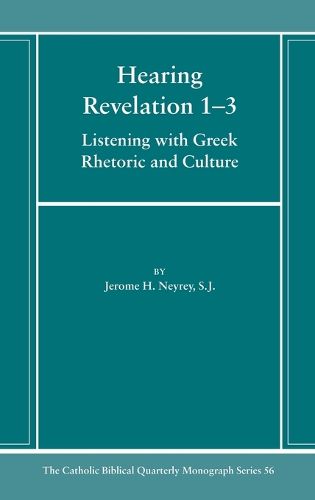Readings Newsletter
Become a Readings Member to make your shopping experience even easier.
Sign in or sign up for free!
You’re not far away from qualifying for FREE standard shipping within Australia
You’ve qualified for FREE standard shipping within Australia
The cart is loading…






This title is printed to order. This book may have been self-published. If so, we cannot guarantee the quality of the content. In the main most books will have gone through the editing process however some may not. We therefore suggest that you be aware of this before ordering this book. If in doubt check either the author or publisher’s details as we are unable to accept any returns unless they are faulty. Please contact us if you have any questions.
Recipients of Revelation listened to it, and heard it like other oral performances. Greek recipients knew not only Greek, but conventional ways of rhetorical presentation typical of Greek culture. They knew how works began (with a proemium, but with focus on speaker's ethos). Ethos of speaker was the first proof of persuading, and so audiences knew what one sounded like. They heard Revelation 1 as a continuous presentation, not like scholars pausing to examine each tile in the mosaic. The Speaker of Revelation 1-3 is Jesus - not John, who delivers God's revelation to the seven churches. After presenting himself in an impressive bodily manner, called an ecphrasis, he addresses seven individual letters. He repeats appropriate aspects of his ethos in his address of each letter. The letter type is solely that of praise and blame. Because this type is opaque to modern readers, the monograph presents examples of letters of praise and of blame. Greek hearers, moreover, valued more than anything praise, honor and respect, and so these cultural values are presented in some detail. Finally, each of the seven letters is then examined in the light of praise and blame, which in this context means in terms of common understanding of the cardinal virtues: prudence, justice, courage, and temperance. The two dominant virtues turn out to be justice and courage. Since most commentators on Revelation consider the cities from the eyes of elite writers of antiquity, the mean character of urban life needs be brought into focus. Only then can the virtues of the non-elites be identified and given proper praise or blame. Whatever else goes on in Revelation, the first three chapters are thoroughly Greek in composition, structure, and values.
$9.00 standard shipping within Australia
FREE standard shipping within Australia for orders over $100.00
Express & International shipping calculated at checkout
This title is printed to order. This book may have been self-published. If so, we cannot guarantee the quality of the content. In the main most books will have gone through the editing process however some may not. We therefore suggest that you be aware of this before ordering this book. If in doubt check either the author or publisher’s details as we are unable to accept any returns unless they are faulty. Please contact us if you have any questions.
Recipients of Revelation listened to it, and heard it like other oral performances. Greek recipients knew not only Greek, but conventional ways of rhetorical presentation typical of Greek culture. They knew how works began (with a proemium, but with focus on speaker's ethos). Ethos of speaker was the first proof of persuading, and so audiences knew what one sounded like. They heard Revelation 1 as a continuous presentation, not like scholars pausing to examine each tile in the mosaic. The Speaker of Revelation 1-3 is Jesus - not John, who delivers God's revelation to the seven churches. After presenting himself in an impressive bodily manner, called an ecphrasis, he addresses seven individual letters. He repeats appropriate aspects of his ethos in his address of each letter. The letter type is solely that of praise and blame. Because this type is opaque to modern readers, the monograph presents examples of letters of praise and of blame. Greek hearers, moreover, valued more than anything praise, honor and respect, and so these cultural values are presented in some detail. Finally, each of the seven letters is then examined in the light of praise and blame, which in this context means in terms of common understanding of the cardinal virtues: prudence, justice, courage, and temperance. The two dominant virtues turn out to be justice and courage. Since most commentators on Revelation consider the cities from the eyes of elite writers of antiquity, the mean character of urban life needs be brought into focus. Only then can the virtues of the non-elites be identified and given proper praise or blame. Whatever else goes on in Revelation, the first three chapters are thoroughly Greek in composition, structure, and values.